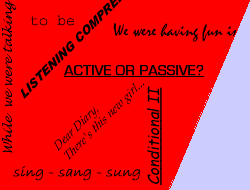
TENSES
In this review of all important grammatical tenses , you will find brief explanations about the use of the different tenses, how to form them, and short examples for each tense.
For more information about all English tenses or a complete overview, please download the printable PDF documents listed at the bottom of this page.
Overview - Irregular Verbs - Forms of "to be"
Past Perfect Tenses - Past Tenses - Present Perfect Tenses - Present Tenses - Future Tenses
General introduction:
The present perfect tense refers to actions between the past and the present.
It can either refer to an action in the past that has a result in the present, to a number of actions that have happened again and again, to an action that started in the past and has just ended a few moments ago or to an action that started in the past and is still in progress.
Time indicators (signal words)
The most important signal words for the present perfect are: for / since, never / ever, just, yet, already;
Other important time indicators include: lately, recently, up to now, this week/month, so far, ...
Present perfect simple & present perfect progressive
have/has + 3rd verb form
a) actions that ended in the past but have a consequence for the present
b) actions in the unspecified past – it is not important when it happened
c) repeated actions that have happened a number of times
- I have forgotten to call, so he is angry now.- I have seen the teacher already.
- He has been in London 3 times already.
have/has + been + 'ing'-form
a) actions that started in the past, are still happening and will continue in the future
b) usually longer, uninterrupted, continuous actions that have not ended yet, i.e. they are still in progress
c) actions that have just finished; there is a clear result
- I have been reading a good book lately; it has 200 pages and I am reading page 40 right now.- He has been waiting in the rain for 20 minutes already.
- You look exhausted! Have you been jogging? - No, I've been playing tennis.
Intensive Grammar Course - Tenses [in German!]
Intensive Grammar Course - key to exercises [in German!]
In this Intensive Grammar Course you will find extensive explanations for all English Tenses. It discusses the use of different tense forms as well as the grammatical forms of all the tenses. Furthermore you can check if you have understood everything in short exercises after each chapter.
short overview of all tenses (except future tenses) [in German!]
short overview of all future tenses [in German!]
These two grammar charts give you a quick overview on all tenses. They are in PDF format, so you can print them out and pin them onto your wall. They can really help you get familiar with the English tenses, so I strongly recommend you download them and have a look!
Please visit the following sites for more on English tenses:
The English Page offers numerous resources for learners of English as a Second Language (ESL).
On this site (www.englishpage.de.vu or englishpage.iris-solutions.org) learners can find all the Grammar Rules and explanations in English, German and Spanish, as well as a great variety of exercises to train and test their Grammar skills: All English tenses (Present Tense Simple, Present Tense Progressive, Past Tense Simple, Past Tense Progressive, Present Perfect Tenses, Past Perfect Tenses, Future Tenses - will & going to future, Mixed tenses); Active or Passive, Indirect Speech (= Reported Speech), Conditionals (if-sentences), Relative Clauses and Contact Clauses, Adjective or Adverb, some - any and other determiners, Gerund or Infinitive, rules for Questions and Negation, Modal Verbs (can, may, must, shall, might...) and of course Irregular Verbs, as well as linking words and other grammar topics are all included in the Grammar section! Start learning English TODAY! Test your knowledge of ESL on downloadable grammar exercise sheets in PDF format and revise the rules!

